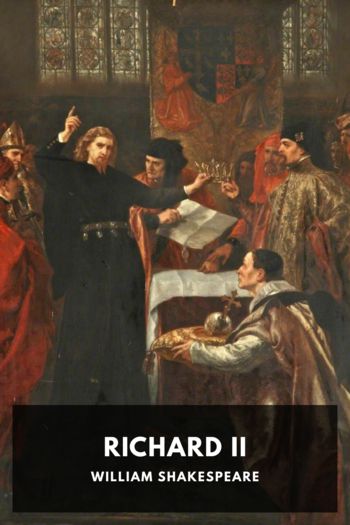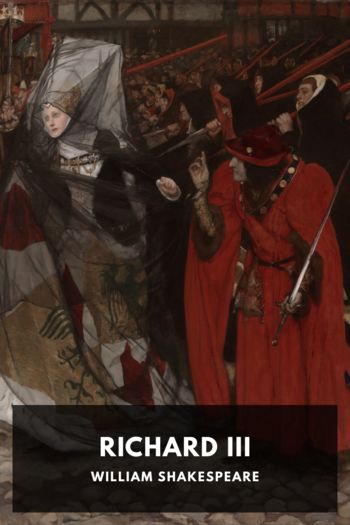Richard II William Shakespeare (best self help books to read TXT) 📖

- Author: William Shakespeare
Book online «Richard II William Shakespeare (best self help books to read TXT) 📖». Author William Shakespeare
Doth with a twofold vigour lift me up
To reach at victory above my head,
Add proof unto mine armour with thy prayers;
And with thy blessings steel my lance’s point,
That it may enter Mowbray’s waxen coat,
And furbish new the name of John a Gaunt,
Even in the lusty haviour of his son. Gaunt
God in thy good cause make thee prosperous!
Be swift like lightning in the execution;
And let thy blows, doubly redoubled,
Fall like amazing thunder on the casque
Of thy adverse pernicious enemy:
Rouse up thy youthful blood, be valiant and live.
However God or fortune cast my lot,
There lives or dies, true to King Richard’s throne,
A loyal, just and upright gentleman:
Never did captive with a freer heart
Cast off his chains of bondage and embrace
His golden uncontroll’d enfranchisement,
More than my dancing soul doth celebrate
This feast of battle with mine adversary.
Most mighty liege, and my companion peers,
Take from my mouth the wish of happy years:
As gentle and as jocund as to jest
Go I to fight: truth hath a quiet breast.
Farewell, my lord: securely I espy
Virtue with valour couched in thine eye.
Order the trial, marshal, and begin.
Harry of Hereford, Lancaster and Derby,
Receive thy lance; and God defend the right!
Harry of Hereford, Lancaster and Derby,
Stands here for God, his sovereign and himself,
On pain to be found false and recreant,
To prove the Duke of Norfolk, Thomas Mowbray,
A traitor to his God, his king and him;
And dares him to set forward to the fight.
Here standeth Thomas Mowbray, Duke of Norfolk,
On pain to be found false and recreant,
Both to defend himself and to approve
Henry of Hereford, Lancaster, and Derby,
To God, his sovereign and to him disloyal;
Courageously and with a free desire
Attending but the signal to begin.
Sound, trumpets; and set forward, combatants. A charge sounded.
Stay, the king hath thrown his warder down.
Let them lay by their helmets and their spears,
And both return back to their chairs again:
Withdraw with us: and let the trumpets sound
While we return these dukes what we decree. A long flourish.
Draw near,
And list what with our council we have done.
For that our kingdom’s earth should not be soil’d
With that dear blood which it hath fostered;
And for our eyes do hate the dire aspect
Of civil wounds plough’d up with neighbours’ sword;
And for we think the eagle-winged pride
Of sky-aspiring and ambitious thoughts,
With rival-hating envy, set on you
To wake our peace, which in our country’s cradle
Draws the sweet infant breath of gentle sleep;
Which so roused up with boisterous untuned drums,
With harsh resounding trumpets’ dreadful bray,
And grating shock of wrathful iron arms,
Might from our quiet confines fright fair peace
And make us wade even in our kindred’s blood;
Therefore, we banish you our territories:
You, cousin Hereford, upon pain of life,
Till twice five summers have enrich’d our fields
Shall not regreet our fair dominions,
But tread the stranger paths of banishment.
Your will be done: this must my comfort be,
That sun that warms you here shall shine on me;
And those his golden beams to you here lent
Shall point on me and gild my banishment.
Norfolk, for thee remains a heavier doom,
Which I with some unwillingness pronounce:
The sly slow hours shall not determinate
The dateless limit of thy dear exile;
The hopeless word of “never to return”
Breathe I against thee, upon pain of life.
A heavy sentence, my most sovereign liege,
And all unlook’d for from your highness’ mouth:
A dearer merit, not so deep a maim
As to be cast forth in the common air,
Have I deserved at your highness’ hands.
The language I have learn’d these forty years,
My native English, now I must forego:
And now my tongue’s use is to me no more
Than an unstringed viol or a harp,
Or like a cunning instrument cased up,
Or, being open, put into his hands
That knows no touch to tune the harmony:
Within my mouth you have engaol’d my tongue,
Doubly portcullis’d with my teeth and lips;
And dull unfeeling barren ignorance
Is made my gaoler to attend on me.
I am too old to fawn upon a nurse,
Too far in years to be a pupil now:
What is thy sentence then but speechless death,
Which robs my tongue from breathing native breath?
It boots thee not to be compassionate:
After our sentence plaining comes too late.
Then thus I turn me from my country’s light,
To dwell in solemn shades of endless night.
Return again, and take an oath with thee.
Lay on our royal sword your banish’d hands;
Swear by the duty that you owe to God—
Our part therein we banish with yourselves—
To keep the oath that we administer:
You never shall, so help you truth and God!
Embrace each other’s love in banishment;
Nor never look upon each other’s face;
Nor never write, regreet, nor reconcile
This louring tempest of your home-bred hate;
Nor never by advised purpose meet
To plot, contrive, or complot any ill
’Gainst us, our state, our subjects, or our land.
Norfolk, so far as to mine enemy:—
By this time, had the king permitted us,
One of our souls had wander’d in the air.
Banish’d this frail sepulchre of our flesh,
As now our flesh is banish’d from this land:
Confess thy treasons ere thou fly the realm;
Since thou hast far to go, bear not along
The clogging burthen of a guilty soul.
No, Bolingbroke: if ever I were traitor,
My name be blotted from the book of life,
And I from heaven banish’d as from hence!
But what thou art, God, thou, and I do know;
And all too soon, I fear, the king shall rue.
Farewell, my liege. Now no way can I stray;
Save back to England, all the world’s my way. Exit.
Uncle, even in the glasses of thine eyes
I see thy grieved heart: thy sad aspect
Hath from the number of his banish’d years
Pluck’d four away. To Bolingbroke. Six frozen winters spent,
Return with welcome home from banishment.
How long a time lies in





Comments (0)